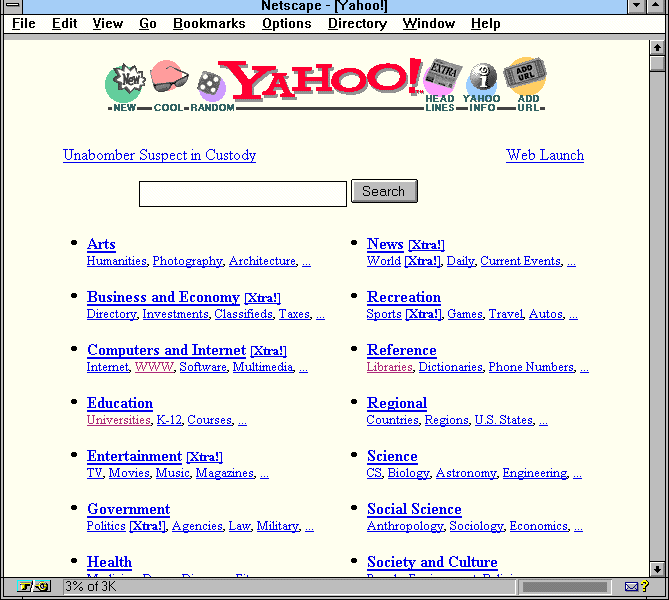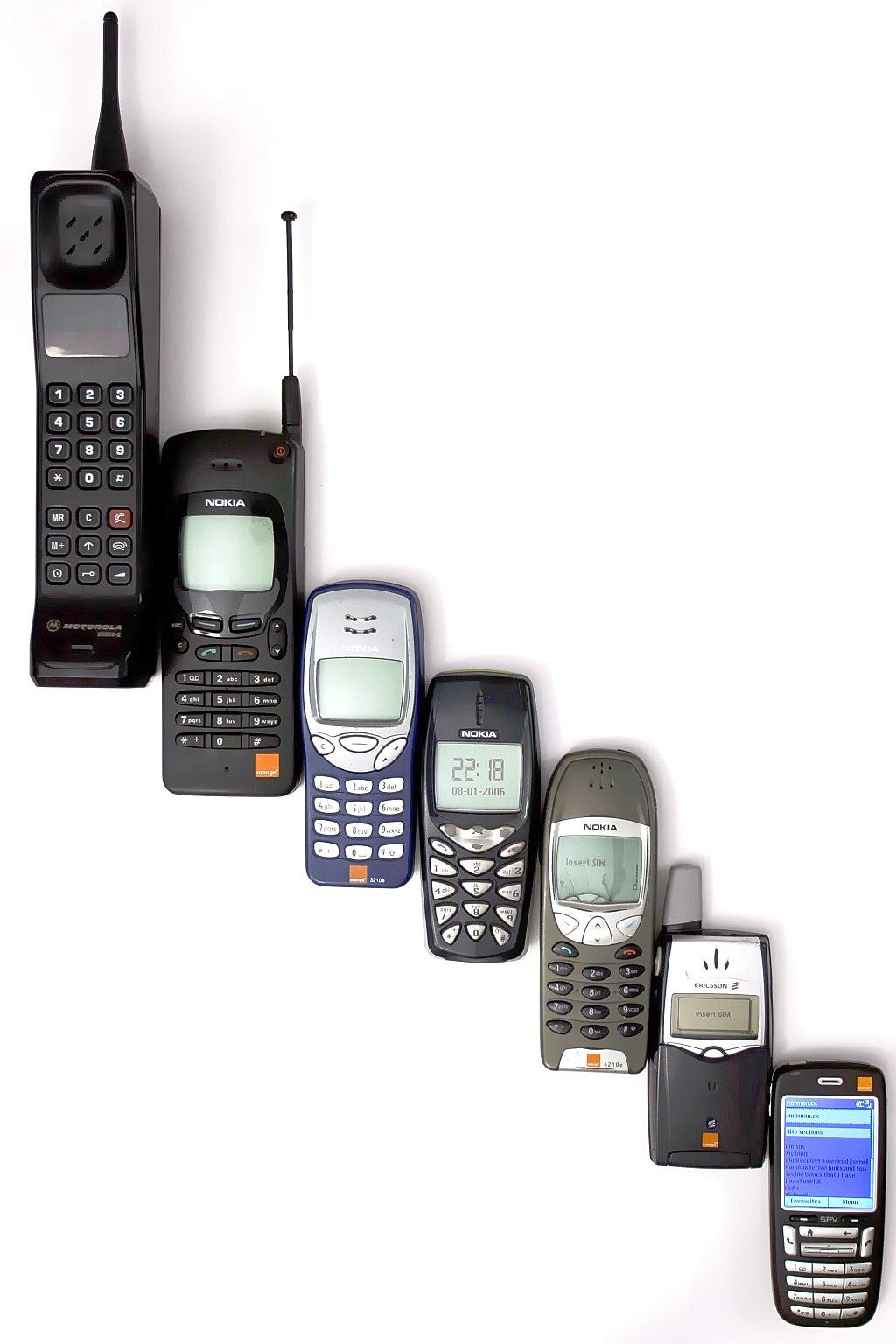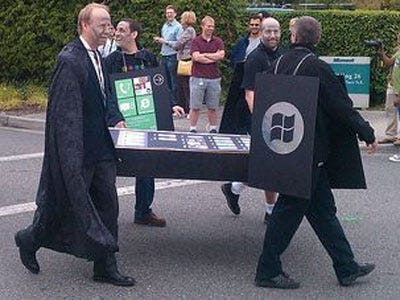The wee hours of the Internet
Gather ‘round and hear the tale of a time before The One Search Engine. At the dawn of the Internet, there wasn’t much search. In the earliest days, Yahoo! (yes, that Yahoo!) started out by putting The Internet into a simple categorical hierarchy.
There were so few web sites that this seemed (albeit briefly), logical. And the search engines that did exist (Lycos, WebCrawler), were fairly terrible. That is, until one fateful day, when appeared… (you guessed it)
AltaVista
A search engine so fast, and so revolutionary that it was game over for everything else. It had it all. You could search [the Web] and display results [in standard form] (It’s been so long now I don’t know and can’t even imagine what the other options were). And if there was a Dope AF web site that it didn’t know about, you could [Add URL] to tell AltaVista about it.
1998
In the late 90s Google escaped from a closet at Stanford and became a company. A company that tried to sell itself to Excite for the hefty sum of $1 million dollars. Excite (as requisite for all great origin stories) laughed them out of the room. The rest is history. (For Google through the ages, check out the Web Design Museum.)
1998 - 2023 Search Hegemony
For 25 years, Google faced no real competition. It simply was and is the home page for the internet. (If you want to know what the opposite end of the internet looks like, check here.) Yes, there were challengers. No, they were never much of a threat. Google had the flywheel cranking. They had the most web searches → which gave them the most data → to feed their algorithms → which gave them the best search results → which gave them the most searches.
Companies like this rarely lose against direct competition. Even though the first screen of search results is entirely ads, Google still doesn’t face a head-on threat.
Rather, market hegemonies lose to asymmetric threats. They lose to something different. Sometimes, something so different it takes them a while to understand what it is.
The Parallel Universe of Personal Computing
Microsoft once had a monopoly like this. It was called, “The personal computer”. They were so dominant in this space that the Justice Department was threating to hit their glass house with a state sanctioned sledgehammer. Such was the threat that Microsoft kept Apple afloat just to claim there was competition (Look! Another computer maker!).
Apple carried on, and made great machines loved by teachers (via generous educational discounts), artists, and later, nerds. They had a loyal following that kept them in low single-digit market share.
Their big break came when the world insisted on producing MP3 players that were crap in every possible way. I imagine Steve Jobbs pulling all his top execs into a room and screaming, “If I don’t have a great MP3 player in 6 months, you’re going to eat one of these while I watch!”
And thus, the iPod was born. And it was amazing.
On an unrelated note, these things called Cell Phones were happening elsewhere in tech-o-sphere, and they were doing something insidious. They were shrinking.
Eventually, they got so small they were about the size of an MP3 player. Which meant:
Cell Phone + iPod = iPhone
iPod Touch + Antman Enlarger = iPad.
How did Microsoft respond. They were initially so dismissive of the iPhone that they held a mock funeral for it.
But suddenly, Microsoft had competition. Between the iPhone and iPad, personal computing was no longer the exclusive domain of laptops and desktops. Personal computing… Fragmented.
Throughout the day you might be working on a laptop, run an errand and use an iPhone, and then later, crawl into in bed and watch a show or read a book on an iPad. Microsoft still had a near monopoly on The Computer, but no longer had a monopoly on computing screens.
Back to Search
The same thing is already playing out with ChatGPT, Bing Chat, and other Large Language Models (LLMs). Bing Chat is an especially viable place to go for certain categories of search - searches were you’re looking for an answer, not a product.
Don’t be dissuaded by all the catastrophizing articles trying to convince you that this technology is unusably bad. It’s like newscasters going to the epicenter of bad weather and giving the impression that gale force winds are the norm for a 100-mile radius, or possibly the entire planet.
If you use this technology, you’ll find it useful. And even with today’s warts, does anyone doubt it will improve? Quickly?
The days of “searching” for “answers” is ending.
So, this is Bad for Google?
First, just because search is absolutely, definitely, fragmenting doesn’t mean Google will lose. Google’s has had this tech in the lab for longer than OpenAI has existed. They have some of the top AI researchers. They’re going to be launching their own chatbot (Bard) before too long. They may emerge with the best solution and maintain their dominant position overall. But their chat page might get more traffic than their search page.
Second, let me ask you, have you gotten rid of your laptop? With personal computing, some usage did move away from laptops. Consuming media, reading articles, etc. is now often done through iOS and Android devices even when a laptop is only a few feet away. And some people are able to get by without owning a computer at all. But in many ways, mobile devices targeted “non consumption”. Meaning they made it possible to use a computer in situations where it just wouldn’t have been practical before. Like… photographing your dinner.
These devices also obliterated non-computer categories. Like, MP3 players, alarm clocks, flashlights, and consumer-grade cameras. Chatbots will have a similar splatter effect. I wouldn’t want to be Quora or wikiHow right now. Even our beloved StackOverflow is feeling the pain.
Like mobile devices, PGA (Pretty Good AI) is crashing into a lot of categories. It’s the beginning of the end of some searches, but it’s carnage and disruption won’t be limited to just that.








